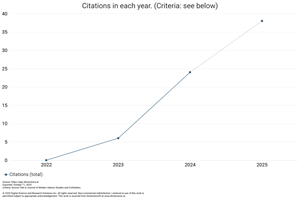Factors Causing the Decline of Islam-Based Political Parties Existence on General Elections 2014
DOI:
https://doi.org/10.59653/jmisc.v2i02.618Keywords:
Islamic Political Parties, Characteristics, StrategiesAbstract
The dynamics of the existence of Islamic political parties on the historical stage of democracy in Indonesia have experienced unstable political dynamics. This is inseparable from the plurality of Indonesian society which does not only contain Muslims but is diverse with a diversity of other religions. This dynamic can be seen in the track record of participation of Islamic political parties in general elections in Indonesia. The vote share of Islamic political parties, which has tended to decline since the reform era, is a matter of note and homework to be completed immediately. Many factors certainly contribute to the small number of Islamic political parties' votes. Party characteristics and ideology are at stake in society's assessment of the existence of Islamic political parties.
Downloads
References
Amir, Zainal Abdidin. 2003. Peta Politik Islam Pasca Soeharto. Jakarta: LP3ES.
Aswandi. 2014. “Grafik Hasil Pemilu 2014”. Diakses melalui http://aswandi.or.id.
Budiardjo, Miriam. 2003. Dasar-Dasar Ilmu Politik. Jakarta: PT. Gramedia Pustaka Utama.
Elyta, Ahmad, M. Z., Jamaliah, Mujiono, D. I. K., Islam, R., & Daud, R. (2023). Impacts of the COVID-19 pandemic on export commodity trading [Special issue]. Journal of Governance & Regulation, 12(3), 274–284. https://doi.org/10.22495/jgrv12i3siart9
Elyta, E., & Sahide, A. (2021). model of creative industry management in border areas to improve bilateral cooperation In Indonesia and Malaysia. Cogent Social Sciences, 7(1). https://doi.org/10.1080/23311886.2021.1974670
Hamdanny, D. R., & Mukhtar, K. (2021). Wacana Poros Partai Islam untuk PILPRES 2024: Politik Identitas atau Penggalangan Suara Oposisi? Politea, 4(2). https://doi.org/10.21043/politea.v4i2.11735
Haryanto, 2003. Kekuasaan Elit; Suatu Bahasan Pengantar. Yogyakarta: Program Pascasarjana PLOD Daerah Universitas Gadjah Mada.
Herdiansah, A. G., Djuyandi, Y., & Sumadinata, W. S. (2019). Extending aliran politics in electoral contest: An insight of Indonesia’s democracy in the post-2014. Central European Journal of International and Security Studies, 13(4).
Hertanto. 2006. Teori-Teori Politik dan Pemikiran Politik Indonesia. Bandar Lampung: Universitas Lampung.
Indobarometer. “Dinamika Partai Berbasis Islam Versus Partai Nasionalis 1955, 1999, 2004, 2008”. Diakses melalui http://indobarometer.com.
Islam R., Herlan, Elyta, Daud, R., Fakhrorazi, A., & Sultana, S. (2023). Analysis of the impact of COVID-19 on the global political economy. Corporate & Business Strategy Review, 4(3), 127–138. https://doi.org/10.22495/cbsrv4i3art13
Malik, D. K. (2016). Partai Politik Islam dan Pemilihan Umum Studi Peningkatan Dukungan Elektoral PKB dan PPP Pada Pemilu Legislatif 2014 DPR RI di Dapil DKI Jakarta. Politik Indonesia: Indonesian Political Science Review, 1(1). https://doi.org/10.15294/jpi.v1i1.9180
Oktavriana, D. R. (2022). Women’s Political Rights Context in Gender and Human Rights Perspective. International Journal of Islamic Thought and Humanities, 1(1). https://doi.org/10.54298/ijith.v1i1.15
OSBIN, S. (2021). DEMOCRACY, POLITICAL IDENTITY, AND THE FATE OF MINORITY POLITICS: REFLECTIONS TOWARDS INDONESIA’S NATIONAL CONCURRENT ELECTIONS IN 2024. Globus: Social Sciences, 7(2(36)). https://doi.org/10.52013/2713-3087-36-2-4
Rosyidin, I., & Heryanto, G. G. (2016). Konstruksi citra partai Islam pada pemilu 2014 pendekatan fikih-siyasah. IJTIHAD Jurnal Wacana Hukum Islam Dan Kemanusiaan, 15(1). https://doi.org/10.18326/ijtihad.v15i1.1-20
Surbakti, Ramlan. 1999. Memahami Ilmu Politik. Jakarta: PT. Gramedia Widiasarana Indonesia.
Yohanes, Y., Al Qadrie, S. R. F., Elyta, E., Olifiani, L. P., & Kurniawan, C. (2023). E-Service in government sector: To what extent has NTB. care affected as a smart citizen reporting site for raising government performance. In E3S Web of Conferences (Vol. 440, p. 04010). EDP Sciences.
Downloads
Published
How to Cite
Issue
Section
License
Copyright (c) 2024 Rahmiana Aclandea, Elyta Elyta, Syarif Redha Fachmi Al Qadrie, Mohammad Nabil Almunawar

This work is licensed under a Creative Commons Attribution-ShareAlike 4.0 International License.
Authors who publish with this journal agree to the following terms:
- Authors retain copyright and grant the journal right of first publication with the work simultaneously licensed under a Creative Commons Attribution-ShareAlike that allows others to share the work with an acknowledgement of the work's authorship and initial publication in this journal.
- Authors are able to enter into separate, additional contractual arrangements for the non-exclusive distribution of the journal's published version of the work (e.g., post it to an institutional repository or publish it in a book), with an acknowledgement of its initial publication in this journal.
- Authors are permitted and encouraged to post their work online (e.g., in institutional repositories or on their website) prior to and during the submission process, as it can lead to productive exchanges, as well as earlier and greater citation of published work (See The Effect of Open Access).
























